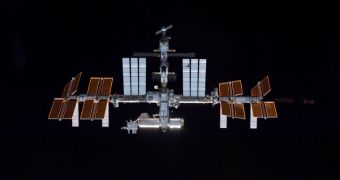The private American company Bigelow Aerospace may soon provide an inflatable module for the International Space Station (ISS), that would be affixed to the existing ones via the same type of docking system.
In order to enhance the potential uses of the orbital facility, the American space agency is currently discussing with the company the possibility of acquiring a Bigelow Expandable Activity Module (BEAM), in order to launch and attach it to the space lab.
Creating affordable, inflatable space habitats such as the BEAM has been the main focus at Bigelow since 1999, when the North Las Vegas, Nevada-based company first started work on this technology.
From the get-go, the targeted market was made up of national space agencies and corporate clients, say officials at the private company, and now it would appear that all the efforts Bigelow put into BEAM are beginning to pay off.
Thus far, the only things the corporation put into space are the orbiting prototypes Genesis I and Genesis II, which were launched in 2006, and 2007 respectively. The firm was found by general contractor, real estate tycoon, and hotel businessman Robert Bigelow, who is also the CEO.
What NASA is aiming for is a significant increase in the amount of livable space that the permanent crew stationed aboard the ISS has access to. Creating standard modules is very expensive, and also require the use of a space shuttle.
However, no new modules are in the works today, and the shuttles are due to be retired this July. Other capsules cannot carry modules, and they cannot be launched separately, and docked automatically.
As such, the possibilities Bigelow is providing appear to be the next best thing, not only in terms of capabilities and performances, but also in terms of initial and maintenance costs. The American space agency also has an extended array of products to chose from.
Over the past few years, Bigelow has been working on producing the Sundancer and BA330 modules, which are considerably larger than the Genesis spacecraft.
According to Michael Gold, the director of Washington, DC, operations and business growth for Bigelow Aerospace LLC, no agreement has yet been signed with NASA.
“But we're looking forward to doing so in the near future and we're pleased about the progress,” the official adds, quoted by Space.
“Most of all, we're excited to see the substantial technological progress made by Bigelow Aerospace via the successful Genesis I and Genesis II missions utilized to take expandable habitat technology to the next level by incorporating such a module into a crewed environment,” he adds.
“We're thrilled to work with NASA to ensure that Bigelow Aerospace's unprecedented private sector investment and progress are fully leveraged to create the dynamic future in space that we are all working toward,” Gold concludes.

 14 DAY TRIAL //
14 DAY TRIAL //